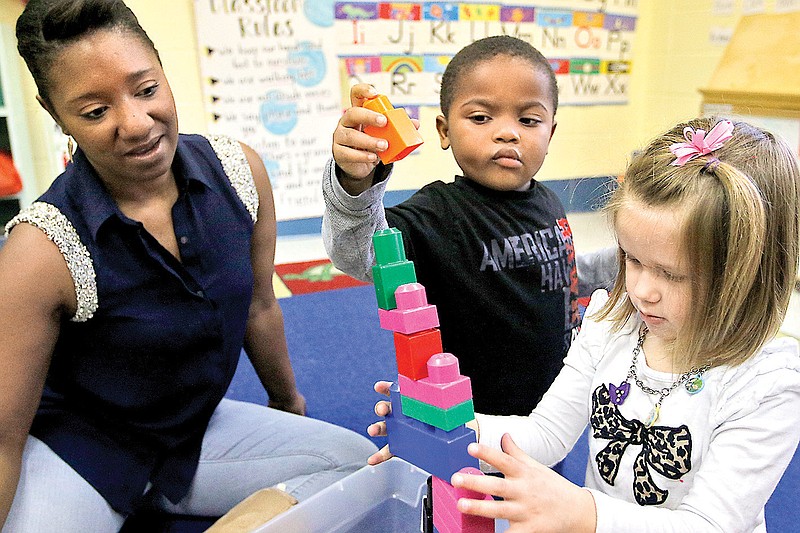The Chambliss Center for Children is undertaking a massive study to identify how to increase poor children's chances of being ready for kindergarten.
The results from the year-long study, funded by a $255,435 planning grant from the W.K. Kellogg Foundation, could lead to a multimillion-dollar project to offer more impoverished children access to quality, early education, Chambliss executives believe.
More than 350 parents whose children attend an early education child-care program at Chambliss will be invited to intimate dinners and asked what their major struggles are as parents and what it would take to be more involved in their children's education. The results of those dinners should help identify resources that already exist in the community and generate project ideas to propose to the Kellogg Foundation that could lead to major funding in the future, officials said.
An estimated 3,354 Chattanooga children under the age of 5 live in poverty. And parents looking for affordable childcare are stuck with few options. Many parents have their names on waiting lists for months, even years, to get a spot for their infant or toddler in child care.
The Chambliss Center currently has 430 kids on their child-care waiting list and every county preschool program in Hamilton County has a waiting list, Schools Superintendent Rick Smith recently said during a public presentation.
If children don't get access to some kind of early education, they usually start their first day of school already behind their peers, said Chambliss Center President Phil Acord. Those children are often raised by a single parent with little access to any education or prenatal care. Often the children come to school with a limited vocabulary, he said.
Less than half of poor children in America are ready for kindergarten by the age of 5 -- that's much lower than their classmates from moderate- or high-income families, who have a 75 percent chance of being ready for school, according to a 2012 Brookings Institution study.
That's why the Chambliss Center decided to narrow the focus of the grant to study how to get more kids access to quality child care and remove other barriers for parents, said Gloria Miller, the center's vice president of community relations.
"We know that the earlier we can get them and help them, when they leave us and start kindergarten they are ready to learn," Miller said. "It's not just about literacy, it's also about the social and emotional development of a child."
In Tennessee, state law allows a person to offer at-home child care without a license to four or fewer unrelated children. That means there are child care centers across the state that are unregulated and don't use a standardized curriculum, Miller said.
Depending on the results from the study, the Chambliss Center may offer training for in-home care providers, she said.
The Kellogg Foundation has funneled millions of dollars to major long-term projects across the country to address poverty, education and racial equality. And once the foundation commits to a project, it often invests years in seeing the plans carried out in a community, said Lesley Berryhill, a Chambliss Center spokeswoman.
"This could lead to the foundation making a five- to 10-year investment in Hamilton County," she said.
Thirty-two miles northwest of Philadelphia, in Pottstown, Pa., a similar grant from the Kellogg Foundation was used to survey parents. Officials discovered the town's Spanish-speaking population was isolated and needed interpreters, language workshops and resources.
The initiative has so far been awarded nearly $1.2 million to fund five projects to get families of young children involved in their education and children ready for kindergarten.
In Chattanooga, the year long study will start June 1, coinciding with the Chambliss Center's capital campaign to raise $5.5 million to expand its child-care center at its main campus in Brainerd and to add two off-site early education programs in partnership with Head Start. But the need is much larger and will need more collaboration across the community, Acord said.
Dolliethea Sandridge, a 27-year-old single mom who has sent her 3-year-old son to the Chambliss Center since he was an infant, said Chattanooga needs more places like Chambliss. Already, her son can recognize letters of the alphabet and knows how to write his name, she said.
"Everybody wants to get their kids into the Chambliss Center, at least where I'm from," she said. "They ask, 'How did you get your kids in there? I've been on the waiting list for years.'"
Contact staff writer Joy Lukachick Smith at jsmith@timesfreepress.com or 423-757-6659.
